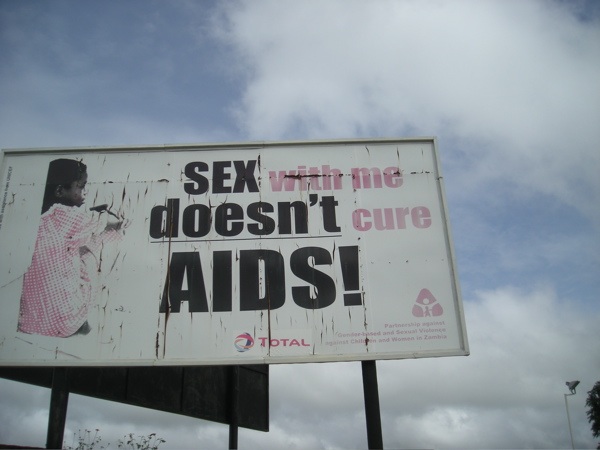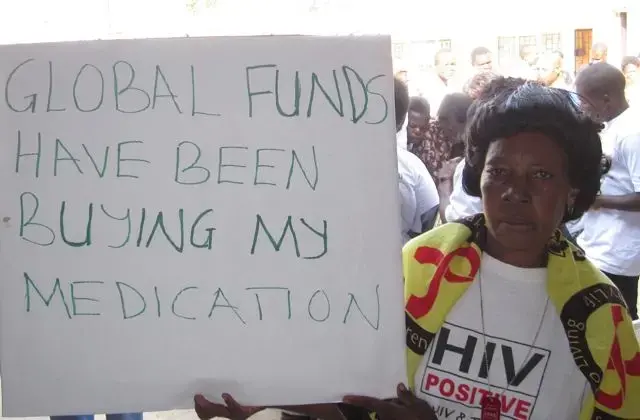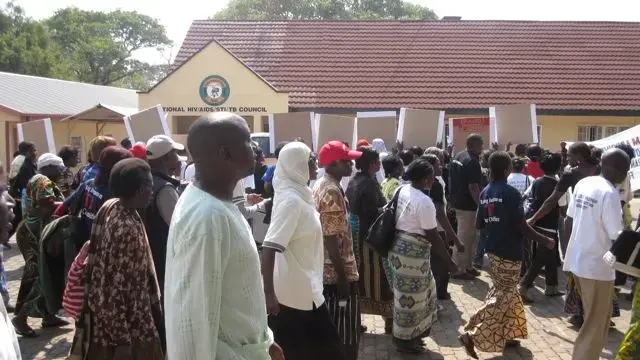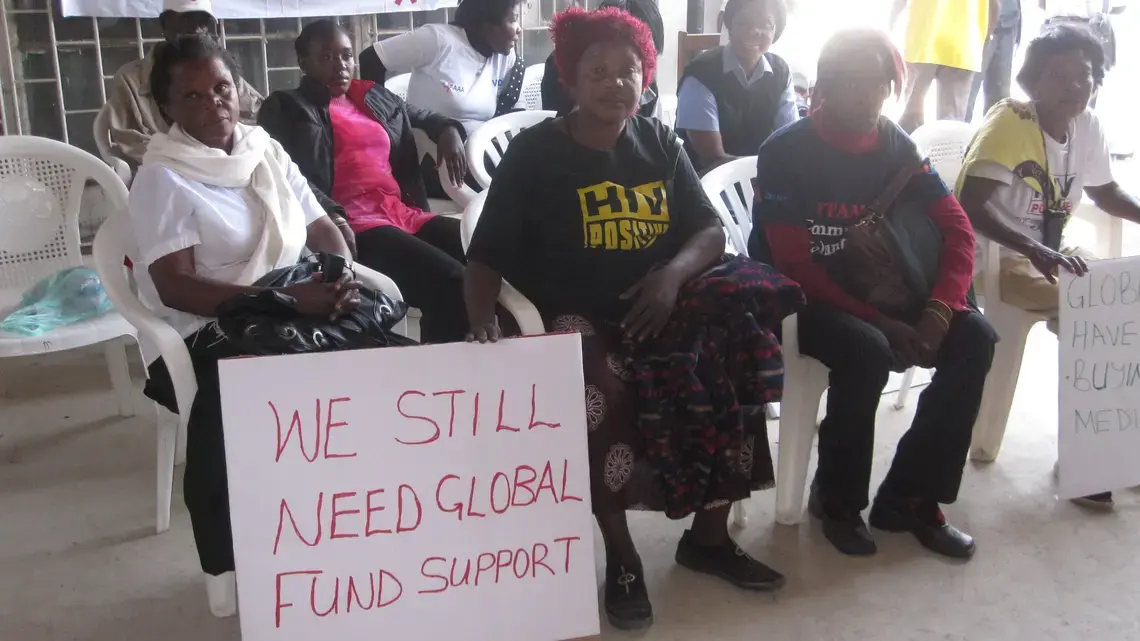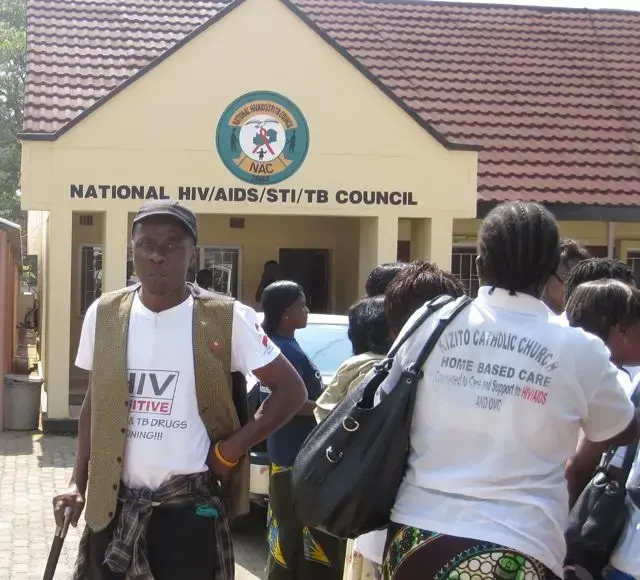Old men and women, nursing mothers, laughing teenage girls, bustling young men, some sickly, some strong—people, in short, who looked like those crowding any minibus in Lusaka—made up the mass of about 300 demonstrators who recently marched onto the grounds of the National AIDS Council, waving home-made signs demanding action.
In the wake of an audit by the Global Fund to Fight AIDS, Tuberculosis and Malaria that found more than a million dollars unaccounted for, and more misspent on high salaries and unauthorized expenses at the local organization charged with distributing funds to community groups, support for the most vulnerable of those living with HIV has dwindled, the protesters said, to life-threatening levels.
Anti-retroviral medicine that had been dispensed in three-month allotments was now doled out in two-week supplies, requiring repeated, day-consuming journeys to distant clinics. Programs supplying food and schooling to orphans and children living with HIV closed. Volunteers, who made up the largest corps of the effort to get treatment and testing to residents of shanty compounds and rural outposts, went without stipends to support their time and travel. Offices of long-standing programs that linked the poorest patients to sources of food, medicine and income shut their doors when the rent came due.
A stand-off has choked the funding necessary to continue programs integral to the distribution of medicine since October, with the Global Fund withholding further funding from the Zambia National AIDS Network (ZNAN), until the Lusaka-based organization accounted for, or returned the missing money.
The focal point of the rally was a petition asking the Zambian officials coordinating the country's AIDS response to take control—to see that the money is paid back, to appoint another organization to distribute funds, and to prod the government to build a trust fund to make it independent from outside donors.
"If we don't do it, who's going to do it for us?" asked Felix Mwanza, director of Treatment Advocacy and Literacy Campaign, which organized the rally. Mwanza is broad-shouldered and energetic and has been an activist since 2003, shortly after his own HIV diagnosis. TALC has existed since 2004. Two meetings in the week preceding the demonstration had briefed participants on the background of the demands, solicited their input, and roused them from a state that Mwanza said had become "too comfortable."
"You see slowly things are changing. What happened is we stopped talking," Mwanza said at the first meeting, which about 50 people attended. "If we weren't comfortable, this wouldn't have happened."
One of the group suggested that the second meeting to plan the demonstration be held on the same day as the demonstration itself, to avoid losing participants, most of whom travel on foot. Mwanza said a second meeting two days before the demonstration was necessary so participants could agree to the content of the petition they would present.
"They have to come," he said. "This is their lives."
So, on the day of the demonstration, those who serve and depend on community HIV support groups gathered early at Hope House in the quiet neighborhood of Villa Elizabetha. They had been advised to wear jeans, as they would be holding a "Die-in, die-out," falling to the ground in unison to illustrate the eventual outcome of service cuts, and rising up to show they could yet be saved. But some of the women wore their best custom-tailored chitenge cloth dresses and outfits, and nearly all wore T-shirts announcing they were HIV positive, that access to treatment and prevention are rights, and that "Two weeks of life is not enough."
Joyce (who prefers her last name not be used), a retired civil servant, was among the first 50 to show up before 8 a.m. Six years ago she looked in the mirror at a bony wasted frame, said: "this is not who I used to be," and summoned the courage to get tested. She began treatment soon after and today has a sturdy bearing and smooth complexion that give her an appearance a good 10 years younger than her actual 50 years.
The clinic in the township of Kanyama, off a rugged unpaved compound north of the city is where she goes. "They saved my life," she said.
The Kanyama clinic, which serves the largest population of HIV patients in Zambia, is also home to the HIV support group, Musayope (the local, Nyanja language word that means "don't be scared") where Joyce serves as volunteer secretary. It is also is where she turned for answers when her youngest child, who at six was diagnosed with HIV the year after she was, asked when he could stop taking the medicine.
In a crowd where mentions of funerals and deaths are sprinkled through conversations as frequently as new jobs or houses might be noted elsewhere, Joyce said the people in her support group, which counts about 150 members do well.
"That's because they adhere to treatment," she said. "That's what we're there for."
This would be her first demonstration, she said. "I heard talk, and I thought I had better look into it."
More arrived, signed petitions, fell to the ground laughing as they rehearsed dying in, dying out, and gathered for another briefing.
"Even as we have demanded the Global Fund give us money, we should be alive to the fact that one day, the Global Fund won't be there," Mwanza said.
They packed seven buses that parked in front of the National AIDS Council Headquarters two miles away, and they filed, singing, through its gate. While waiting for officials to come outside, they laughed as they fell to the ground in simulated death, to rise again quickly.
Mwindaace Siamwiza, chairman of the Country Coordinating Mechanism, which distributes Global Funds came out with National AIDS Council Director Ben Chirwa, and accepted the petitions, acknowledging the problems listed on them.
For now, the local faith-based group, Churches Health Association of Zambia, would fill the void left by ZNAN, allowing money to flow again, he said.
Although it is a temporary measure that can't, in the long term, replace a secular, community-based group, Mwanza was pleased and believes the government will follow up.
"The petitions," he said, "added impetus."


